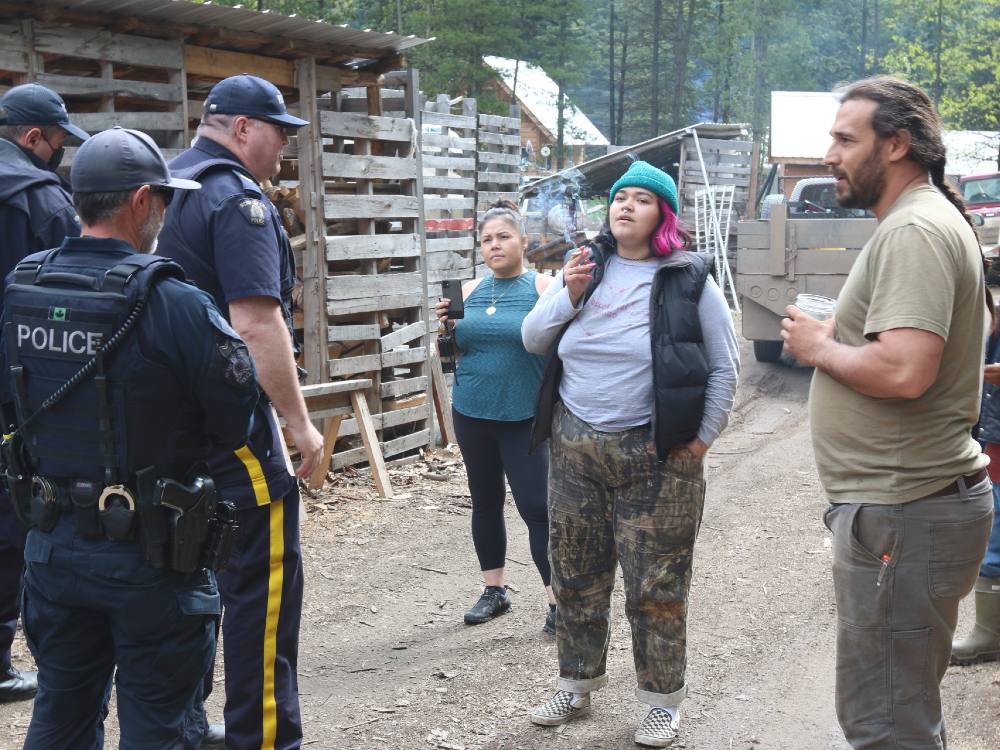An ongoing RCMP presence on the Morice Forest Service Road in northern B.C., where a gas pipeline is under construction through Wet’suwet’en territory, has cost Canada’s police force more than $25 million.
The most recent accounting, obtained by The Tyee through federal access to information laws, covers policing costs from April 1, 2021, to March 31, 2022, and shows that, over the course of a year, the force spent $6.8 million policing the area.
Most of those expenses, roughly $4.5 million, were accrued during the first three months of this year, based on separate accounting that showed the RCMP had spent just over $21 million by Dec. 31, 2021, three years after the conflict began.
The RCMP’s presence in the area dates back to January 2019, after Coastal GasLink was granted an injunction by the B.C. Supreme Court that prevents anyone from blocking access to pipeline worksites or access roads. That has led to several high-profile police actions on the territory when pipeline opponents have blocked access to construction traffic.
While expense sheets indicated a decline in RCMP presence on the territory in 2021, with $2.3 million spent between April and December last year, policing costs appear to be on the rise again as Coastal GasLink begins to drill so that its 670-kilometre pipeline can pass under the Morice River, a sacred waterway known to the Wet’suwet’en as Wedzin Kwa.
The RCMP did not respond to The Tyee’s questions about the recent rise in policing costs or whether it had increased its presence in the area in response to construction activity.
Wet’suwet’en Hereditary Chief Na’Moks, whose English name is John Ridsdale, told The Tyee on Monday that nation members have seen RCMP officers escorting equipment believed to be used for the drilling operation to the site, adding that there has been a general increase in the number of police in the area.
“A couple weeks ago, a half dozen of us Chiefs went up there and a dozen cops jumped out of their vehicles, hands on their weapons, flagging us off the road to check on us. Meanwhile, industry vehicles just roared by,” Na’Moks said.
He added that when the Chiefs asked why the industry vehicles weren’t being stopped, they were told police did not have enough officers to pull over more than two vehicles at a time. “And yet there were 12 officers,” he said.
The past year has seen two significant pipeline-related conflicts on Wet’suwet’en territory, both of them at Coastal GasLink’s drill site, which sits next to the Morice River and about 65 kilometres southwest of Houston, B.C.
Last November, the RCMP arrested 30 people over two days after those opposing the project established a camp at the drill site and spent two months occupying the site.
Among those arrested were two journalists who spent several days in custody. Coastal GasLink later announced it would not pursue charges against the journalists. Among the others arrested, 19 others now face criminal contempt charges.
Then, in February, Coastal GasLink reported millions of dollars in damage at the drill site after masked assailants allegedly chased off workers and used the company’s machinery to destroy equipment at the site.
At the time, the RCMP said it was assigning 40 investigators to the case. No arrests have been made and the force did not respond to The Tyee’s request for an update.
Following the alleged attack, the RCMP increased its presence along the Morice Forest Service Road. It began entering a camp established by Gidimt’en Clan members for the first time, for several months doing regular sweeps through the camp multiple times a day and during the night.
While Na’Moks said policing in the area hit “a bit of a lull” over the summer, he added that it appeared to be increasing in recent months as Coastal GasLink prepared to begin drilling under Wedzin Kwa.
Police presence on the Morice road dates back to January 2019, after RCMP arrested 14 people at Gidimt’en Camp and established a remote police detachment called the Community-Industry Safety Office 30 kilometres south of Houston. Removal of the C-ISO detachment was a condition of the Wet’suwet’en hereditary leadership as it prepared to go into talks with the provincial and federal governments after 28 people were arrested during a five-day police action in February 2020.
While the detachment remains, RCMP have said previously that their patrols are now based out of Houston. The force did not respond to The Tyee’s requests for an update on the C-ISO detachment.
Chief Na’Moks, who makes regular trips to the area to monitor pipeline construction, said he won’t be deterred by the increased police presence on the territory.
“The more pressure they put on us the more sense it makes to go out there, because what they’re doing is illegal by restricting that access,” he said. “They have no legal right to do it. Our constitution says we have a right to our enjoyment and use of the land — hunting, fishing, medicine and berries.”
TC Energy, the company building the Coastal GasLink pipeline, has maintained that the drilling method being used, known as micro-tunnelling, is “the safest method to cross the Morice River.”
The company has also pointed to impact benefits agreements signed with 20 First Nations along the pipeline route as evidence of support for the project. ![]()
Read more: Indigenous, Rights + Justice

















Tyee Commenting Guidelines
Comments that violate guidelines risk being deleted, and violations may result in a temporary or permanent user ban. Maintain the spirit of good conversation to stay in the discussion.
*Please note The Tyee is not a forum for spreading misinformation about COVID-19, denying its existence or minimizing its risk to public health.
Do:
Do not: